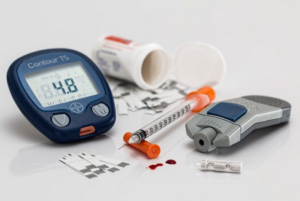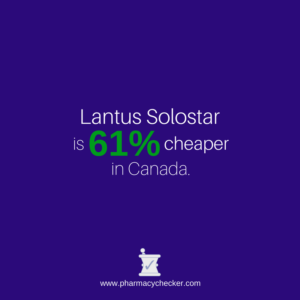by Lucia Mueller, President, PharmacyChecker.com | Sep 15, 2017 | Advocacy, Drug Prices, Insulin
 There is profound frustration and anger reverberating throughout the diabetic community due to the skyrocketing prices of insulin in the United States. Pharmaceutical companies like Novo Nordisk, Eli Lilly and Sanofi are charging out-of-reach prices for insulin medications necessary for diabetics’ survival.
There is profound frustration and anger reverberating throughout the diabetic community due to the skyrocketing prices of insulin in the United States. Pharmaceutical companies like Novo Nordisk, Eli Lilly and Sanofi are charging out-of-reach prices for insulin medications necessary for diabetics’ survival.
On September 9th, 2017, over forty people gathered outside of Eli Lilly headquarters in Indianapolis to make a statement on behalf of American citizens living with diabetes and, in actuality, all Americans who face the highest drug prices in the world.
(more…)
Tagged with: #insulin4all, Big Pharma, diabetes, Drug Prices, Eli Lilly, Insulin, Novo Nordisk
by Lucia Mueller, President, PharmacyChecker.com | Sep 1, 2017 | Drug Importation
 With insulin prices skyrocketing, no wonder the diabetic community is taking to social media to network and share their experiences as they swap tips and tricks not only for moral support, but also financial.
With insulin prices skyrocketing, no wonder the diabetic community is taking to social media to network and share their experiences as they swap tips and tricks not only for moral support, but also financial.
This month, we received an interesting consumer comment via our Facebook page asking if we knew that Americans are driving to Canada to buy insulin without a prescription. Well, no. As our primary focus is mail-order pharmacy, it wasn’t on our radar. Nevertheless, it sparked our interest and we’d like to share our findings with the PharmacyChecker community.
 After calling 20 pharmacies across Canada (specifically in the following cities: Québec City, Toronto, Alberta, Victoria, Winnipeg and Regina) the answer is clear: Americans can obtain insulin without a prescription in Canada. All pharmacists that I called reported—rather matter-of-factly—that you do not need a prescription for any insulin product, which would include Lantus Solostar, Humalog and Levemir. We specifically talked about Lantus Solostar, a popular, long-acting insulin. The price in Canada for a three-month supply of Lantus Solostar (3 ml) is currently around $447.00 while the average retail price in the U.S. is a staggering $1,160.39. Apparently, they practice what they preach: all patients—including Americans—do not need a prescription to obtain insulin in Canada. While a prescription is not needed, the drugs are available only from the pharmacist and must be retained within an area of the pharmacy where there is no public access and no opportunity for patient self-selection (also known in the U.S. as Behind the Counter (BTC).
After calling 20 pharmacies across Canada (specifically in the following cities: Québec City, Toronto, Alberta, Victoria, Winnipeg and Regina) the answer is clear: Americans can obtain insulin without a prescription in Canada. All pharmacists that I called reported—rather matter-of-factly—that you do not need a prescription for any insulin product, which would include Lantus Solostar, Humalog and Levemir. We specifically talked about Lantus Solostar, a popular, long-acting insulin. The price in Canada for a three-month supply of Lantus Solostar (3 ml) is currently around $447.00 while the average retail price in the U.S. is a staggering $1,160.39. Apparently, they practice what they preach: all patients—including Americans—do not need a prescription to obtain insulin in Canada. While a prescription is not needed, the drugs are available only from the pharmacist and must be retained within an area of the pharmacy where there is no public access and no opportunity for patient self-selection (also known in the U.S. as Behind the Counter (BTC).
There are some important nuances about insulin sales in Canada that might interest you. To start, insulin is not on the Health Canada Prescription Drug List. Health Canada—the regulatory agency in Canada that is comparable to the FDA in the United States—lists insulin as a Schedule II drug. The word “schedule” in the U.S. is used to identify those medications associated with greater potential for addiction, such as Ambien or Vicodin (a prescription opiate) and other controlled substnaces. The lexicon is confusingly different in Canada and important to explain here! In Canada, Schedule II drugs, while not as strictly regulated, do still require professional intervention from the pharmacist at the point of sale and possibly a referral to a practitioner. Click here for the drug schedules regulations in British Columbia.
And did you know that when you’re crossing the border, the U.S. Customs Border Patrol (CBP) is not allowed to stop the importation of FDA-approved medication from Canada for personal use – even though it’s technically prohibited? See: Public Law 115-31. Now you know!
Something to keep in mind for those Americans ordering medications from Canada (or from any other country) through a PharmacyChecker-verified online pharmacy: you must have a prescription if a prescription is required in the United States even if one is not required elsewhere!
So, in practice, insulin products can be sold in Canada without a prescription after consultation with a pharmacist. Sound great? It is! Nevertheless, be sure to give that friendly Canadian pharmacist a call to make sure they can help you before filling up your tank for that road trip to Toronto.
Tagged with: Canada Pharmacy, diabetes, Drive to Canada, Insulin, Type 1 Diabetes, Type 2 Diabates
by Gabriel Levitt, Vice President, PharmacyChecker.com and Sam Werbalowsky, Pharmacychecker.com | Nov 27, 2013 | Online Pharmacies
Mail order pharmacies, including online pharmacies, have their benefits; your medicine comes right to your doorstep, you have more privacy regarding your medication, and, usually, you don’t have to spend as much as you would in a brick-and-mortar pharmacy. A new study of diabetic patients, “Safety and Effectiveness of Mail Order Pharmacy Use in Diabetes,” finds that using mail-order pharmacies may actually prevent negative health outcomes more so than walk-in pharmacies.
The study focused on diabetics because they are at high risk of being prescribed contraindicated medications (ones that would interfere with their normal drug regimens) and often require laboratory work to monitor the effectiveness of their medications. Some may think that patients using mail order pharmacies will experience more negative health outcomes than those using walk-in pharmacies because they do not have face-to-face interactions with pharmacists.
The study found that use of mail order pharmacies “was not negatively associated with patient safety outcomes overall, suggesting that mail order use does not serve as a barrier to receiving primary and preventive care services for most patients.” In fact, the study showed that mail order pharmacy users under 65 were less likely than local pharmacy users to visit emergency rooms. However, mail order pharmacy users under 65 on a subset of diabetic medications were more likely to forego a recommended serum creatinine lab test within 30 days. Patients over 65 who used mail order pharmacies were also less likely than local pharmacy users to have preventable emergency room visits. Despite the health benefits of mail order pharmacy, the study cautions that preventive and primary care must be kept in mind when encouraging their use.
We’re pleased to see the health benefits of mail order pharmacies highlighted in this study; after all, reputable online pharmacies are mail order pharmacies that allow patients to access medication safely and affordably.
Tagged with: diabetes, health outcomes
 There is profound frustration and anger reverberating throughout the diabetic community due to the skyrocketing prices of insulin in the United States. Pharmaceutical companies like Novo Nordisk, Eli Lilly and Sanofi are charging out-of-reach prices for insulin medications necessary for diabetics’ survival.
There is profound frustration and anger reverberating throughout the diabetic community due to the skyrocketing prices of insulin in the United States. Pharmaceutical companies like Novo Nordisk, Eli Lilly and Sanofi are charging out-of-reach prices for insulin medications necessary for diabetics’ survival.



